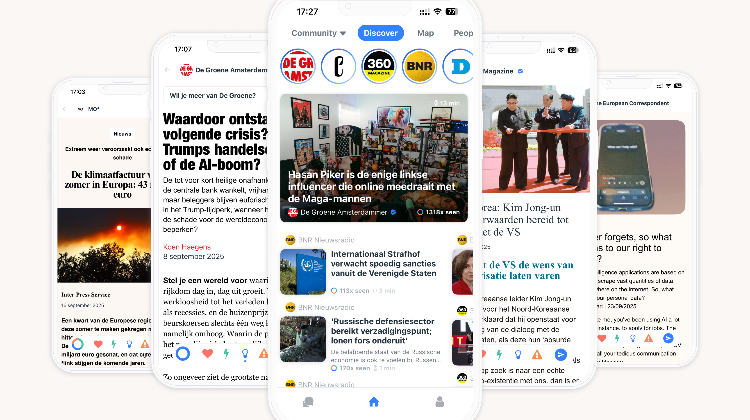Developed by a UU graduate
This app allows students to read news articles without paywalls

‘Since they can’t afford those subscriptions, many students only follow the news through social media, where the line between what is real and what is not is becoming increasingly blurred,’ says Sophie. ‘Besides, most content on social media is short-form, and there is no depth to it. How great would it be if all students, regardless of their background, could have access to high-quality journalism?’
In January 2025, Sophie, who holds a bachelor’s degree in Chinese Studies from Leiden University, and her friend Theo, who has recently graduated with a Master’s in Artificial Intelligence at UU, began approaching news outlets in the Netherlands and Belgium. They asked them if they would be interested in making news articles available on Momo without a paywall. The two friends focused their efforts on publishers that offer in-depth, investigative journalism, so that the app wouldn’t be just a collection of anxiety-inducing breaking news.
‘All publishers we’ve spoken to so far are very excited about our idea because reaching out to young people is a challenge for them,’ explains Sophie. Seven outlets, including De Groene Amsterdammer, 360 Magazine and the European Correspondent, have joined Momo so far. DUB is there as well.
Sophie and Theo aim to expand the number of publishers as much as possible to ensure a diverse offering from across the political spectrum and also reflecting different fields of study. ‘Social media algorithms give users more of what they like. Momo does the opposite. We want to expose students to a diverse set of news providers so that they become thoughtful, mature citizens,’ says Theo. ‘The world is so polarised right now. Young people need to get in touch with different perspectives.’
New articles are published on the app every day in both Dutch and English, totalling about 250 a week. Users must have a student email account provided by a Dutch university or university of applied sciences to have access to all articles. However, some of the content on Momo is accessible to anyone who downloads the app. Once a user graduates, they can benefit from a special discount on a subscription to some of the partner outlets. Theo and Sophie are currently brainstorming additional advantages for graduates.
It is up to each news outlet to decide which articles to offer for free on Momo, and how many. Some offer eight articles a day, others eight a month, for example. Theo and Sophie’s main goal is to ensure that no single outlet dominates the app. All publishers must be equally visible, regardless of the number of articles they provide. Developing that algorithm was the topic of Theo’s Master’s thesis.
Students from all fields of study are on the platform, from Psychology to Mathematics. Though Theo and Sophie would prefer not to reveal exactly how many users their app has at the moment, they say they are on track to add 10,000 new users this semester. They are aware that students from different fields have different needs in terms of content, but they believe that increasing the number of users will help attract more publishers.
According to the two co-founders, the feedback from students has been positive so far. ‘Some are asking us if we can include this or that publisher, while others say that it’s handy to have several outlets on a single app,’ reports Sophie.
‘They don’t know what they can or want to do’

Bringing students closer to high-quality journalism wasn’t the main thing on Sophie and Theo’s minds when they got started about two years ago. Like many start-ups, their project evolved as they progressed. Momo was designed to help students discover their career aspirations. ‘Applying to jobs is a great source of stress for many students, especially those in broader programmes like the one I graduated from,’ says Chinese Studies graduate Sophie. ‘They don’t know what they can or want to do.’
Theo can relate. A few years ago, he did an internship at a big company. It was a great job on paper, but after a while, he wondered if that was what he really wanted to do. He is far from the only one. The two friends noticed that several of their acquaintances had a mental image of where they wanted to work, only to land a job there and wonder if that kind of life would make them happy after all. ‘This often happens because students are in bubbles. Study associations often have sponsors, and those are the businesses and organisations students are most exposed to,’ explains Theo.
The two friends then had the idea of building an app that would expose students to a more diverse set of companies, discussions and social issues. A tool to support them in their personal and professional development. One glance at Sophie’s parents’ cat, Momo, was all it took to come up with a name. ‘It’s catchy!’
They began listing events organised by organisations such as Studium Generale and study associations from several universities. They also got the first users and feedback through those associations. As time went by, the two friends realised that the app needed more. That’s when the light bulb moment of also featuring high-quality journalism without paywalls happened.
However, they have never lost sight of the original mission of helping students figure out their career paths. Another short-term goal of Theo and Sophie’s is to add a career tab to Momo, where students can find career-related content, vacancies, and information about companies, offices, and organisations. These will pay to be featured. ‘We were thinking of contacting career services or UU as a whole to see if they could contribute to this section or have any ideas,’ says Theo.
‘It’s all about students’ development,’ they say with a smile. The career tab is expected to be launched at the end of this month.
Momo is available for iPhone at the iOS App Store and for Android at the Google Play Store.
Hmmmm, ik vraag me af of krantenabonnementen echt te duur zijn voor studenten. Alle kranten hebben studenten abonnementen. Die van Follow the money zijn zelfs gratis! Je zou met je ouders/verzorgers een abonnement kunnen delen, of met je huisgenoten. In de universitaire bibliotheek liggen kranten, maar ook allerlei andere zeer inhoudelijke tijdschriften. Maar je kan ook gewoon af en toe naar nos.nl gaan, de NOS-app op je telefoon installeren of via NPO.nl af en toe naar het NOS-journaal kijken. Daar komt allemaal geen algoritme aan te pas.
Ik denk dat het meer een kwestie van mindset en prioriteiten is, dan van geld. Mensen lijken de rechtstaat als een gegeven te zien en vergeten dat we er een deel van onze tijd en middelen voor moeten inzetten. Als je de paar euro per maand voor je nieuwsmedium ook ziet als een donatie aan de vrijheid die we genieten, krijg je ook nog meer waar voor je geld ook. Desalniettemin een mooi initiatief.